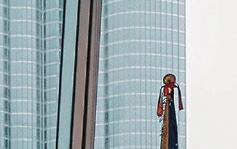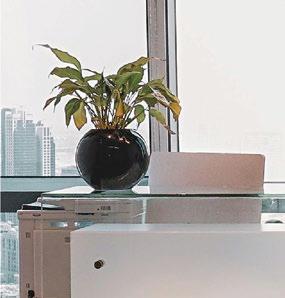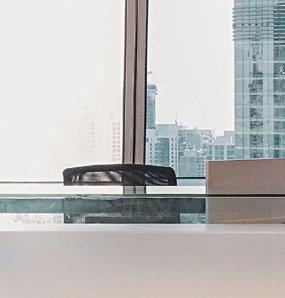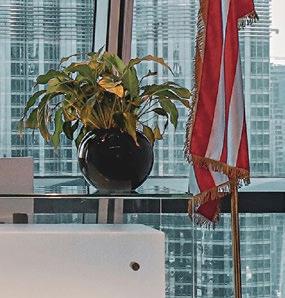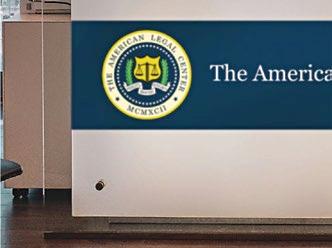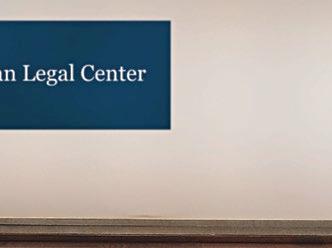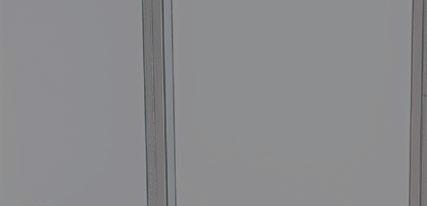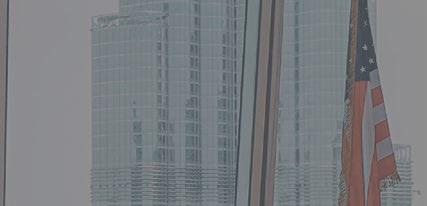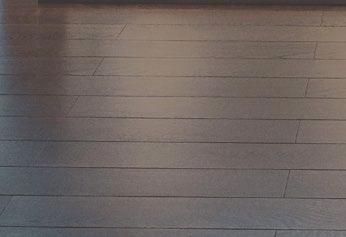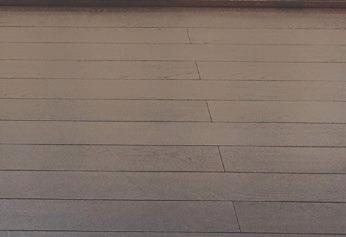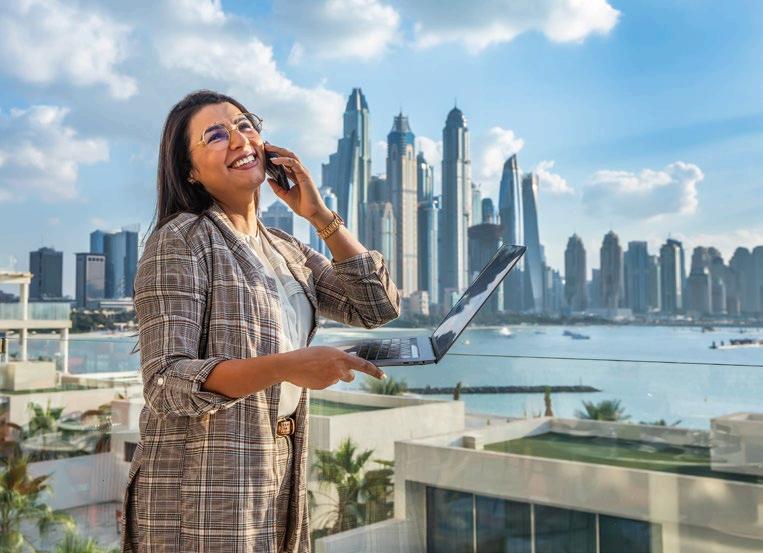
8 minute read
THE APPEAL OF REMOTE WORKING IN THE UAE
The ease and appeal of remote working in the UAE
From new visa rules to a robust vaccination programme, there are a long list of factors drawing overseas professionals to relocate to the country, explains Shai Zamanian, U.S. Licensed Lawyer and Migration Specialist at The American Legal Center, based in Dubai
Heads of state from many western nations have proclaimed for their citizens to “come back home” and stay in isolation, while riding out the effects of the COVID-19 pandemic. As the west continues lockdown measures, there is a sect of society that refuses to spend all their time reluctantly indoors. Many yearn for the drone of the passenger jumbo jets and the excitement of passing through passport control in search of the next adventure.
Notwithstanding the will and desire of passengers, countries hoping to attract lost revenue in tourism have turned to the appeal of longer stay travellers that could benefit from working remotely and escaping from what some perceive to be repressive lockdown measures.
Islands and remote destinations ranging from Antigua, Barbuda, Barbados and Bermuda to Estonia, Georgia and Mauritius have all launched remote work visas to attract long-term guests seeking an outdoor life while staying connected to the office via Zoom and other online plat-
forms. Yet, Dubai and the United Arab Emirates have a much different proposition. Perhaps a week on an island sounds great, but nothing beats being in a multifaceted city that allows a corniche of sandy beaches along with the entertainment of a bigger metropolis. Due to the less restrictive lockdown measures in the UAE, coupled with the dynamism of its cities, there has been greater demand for people extending their stay and working remotely.
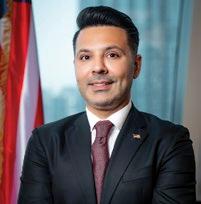
Why are UAE lockdown measures less restricted?
There are two factors that give the UAE a cutting edge over the COVID-19 pandemic, allowing for less restrictive lockdowns. The first is the vaccination rate of the population and the second is the demographics of the population.
As of late April, the global vaccination rate was approximately nine million people, accounting for around seven per cent of the world’s inhabitants.
In the UAE, a total of 95 doses of the COVID-19 vaccination per 100 people had been administered at this point, among the highest COVID-19 vaccination rate of all countries worldwide. This compares extremely favourably to countries such as Germany and India, which are trailing behind with a vaccination rate of 25 per cent and nine per cent respectively.
Understandably, when most of a population is immune to an infectious disease, this provides indirect protection – or population immunity, also referred to as herd immunity or herd protection. Thus, due to a higher vaccination rate within the controlled borders of the UAE, there is a greater sense of protection. Aside from the vaccination rate, understanding the demographics of the population provides a better picture of why the UAE can afford less restrictive measures. Approximately 88.52 per cent of the UAE’s population comprises expatriates. Within this contingency, a sizable percentage are younger people – those under the age of 50 who are looking to jumpstart their careers.
Generally, younger populations are less prone to the serious complications of the COVID-19 disease. They stay in the UAE by virtue of their job sponsorship, which ensures their daily productivity. Prior to employment, they are medically screened for communicable diseases, which includes an X-ray for respiratory infections such as Tuberculosis.
Once employed, many of these youngsters are provided with health care benefits through private insurers. All-in-all, the average age in the UAE is about 30, whereas in the United States it is about 38, and in Japan it’s about 48.
Thus, having a younger population that remains productive is another reason why the UAE can maintain more lenient lockdown measures.
What new visas have been introduced?
Perceiving this opportunity to attract remote workers, the UAE government has acted quickly in response. It passed new resolutions that are among several initiatives approved by the cabinet during meetings chaired by His Highness Sheikh Mohammed bin Rashid Al Maktoum, Vice President and Prime Minister of the UAE and Ruler of Dubai, to position the UAE as an ideal work and tourist destination. The UAE cabinet has both expanded visit visa eligibility and approved a new selfsponsored Remote Work Visa that enables employees from all over the world to live and work remotely in the UAE, even if their companies are based in another country. The introduction of these new measures is set to contribute to the rebound of the country’s expat population, particularly the highly skilled and higher income brackets. There are two types of visas:
The multiple entry visa: This new visa can now be issued to all nationalities in a step that aims to facilitate the process for tourists and visitors. The fiveyear visa enables tourists to enter multiple times on self-sponsorship and remain in the country for 90 days on each visit, which can be extended for another 90 days. This five-year visa does not require a guarantor in the way traditional residency visas are issued. The remote work visa: This visa allows foreigners to enter the UAE under self-sponsorship and work in line with terms and conditions issued with the visa. In order to be considered for the new remote work visa, an applicant must currently earn a minimum of US$5,000 per month. The visa itself costs $287 per person per year.
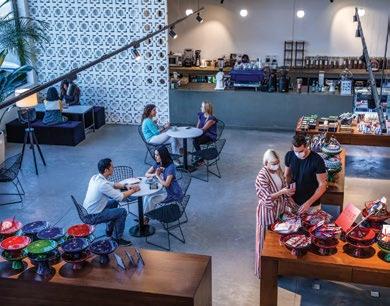
FROM TOP LEFT: Dubai launched a remote work programme last year; co-working spaces and free Wi-Fi are found all over town; Shai Zamanian
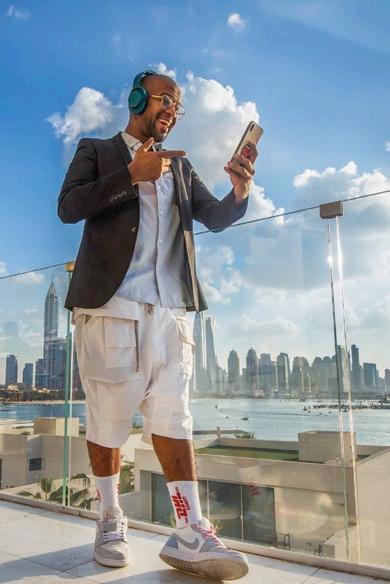
What has been the impact on the real estate and private sectors?
The real estate sector has seen an immediate response as foreigners first get settled into their new environment. Bardia Eshghi, managing partner of Grand Lux Properties, with offices in Downtown Dubai believes the initiative could go a long way in driving property sales in the UAE.
“The global pandemic imposed a change wherein our homes became our offices too. This resulted in an uptick in demand for ready villas and townhouses as families searched for more spacious units. The upward prices are also reflective of increased demand over the last six months. Now, as overseas remote workers look to call the UAE home without the need for separate office space, we can expect continued increase all-around. End-users and investors alike should look to buy property in Dubai soon to reap the benefits over the coming years.”
Dubai promises a dynamic work and leisure environment
Notwithstanding property valuations, there is an understanding that the private sector will see a rebound and take the fiscal edge off from the pandemic. Amir Nassiri, a director at JLL’s Dubai headquarters says the new visa initiatives represent “another positive step for the UAE as it will draw top talent into the region”. He adds: “It will contribute to a rebound of the expanded population, which should give a boost to the real estate market and the local economy.”
Among the sectors set to benefit from the new remote working visa are freelancers, entrepreneurs with e-commerce or web based businesses, and other consultants and those operating in the online sphere. Among those that have untaken the proposition, many are happy with the decision of embarking on a new remote work environment in Dubai and the UAE.
What has been the response from remote workers who have taken the plunge?
Uptin Saiidi, a newcomer as a remote working entrepreneur and the founder of Up10 Media, describes his experience thus far: “I decided to leave California and come to Dubai once I heard everyday life was quite normal and the UAE is investing heavily in new media initiatives. The first thing I did when I landed in Dubai was join a gym and a co-working space, which felt amazing, considering these were closed in the US at the time. After just a few weeks in Dubai, I realised this would be the perfect place to register my business. The forward-thinking initiatives, the incredible networking and the ambitious visionaries I’ve met have made me really excited for its future. I went from a ‘digital nomad’ visiting Dubai for a few months, to actually registering my business and now I’m excited to build and grow my career here.”
For those in the creative space specifically, they have found that remote working in Dubai and the prospect of daily interactions could result in greater productivity.
Sara Javadi, the founder of Waves by Sara, an online e-commerce platform providing artistic face masks and hair accessories, reveals how her daily interactions with Dubai and its people gave her business a boost and encouraged her to stay in the UAE for much longer.
“It’s unbelievable the diversity of this country,” she says. I’ve met people from around the globe, each with different points and perspectives on the pandemic. My experiences working remotely here have positively affected and inspired my designs for next season.”
She initially travelled to Dubai in search of designer silks for her face masks, but ultimately extended her stay twice as the city provided all the means she required to run her online business: “Everywhere I’ve been, there is free Wi-fi and the world is now my office desk.”

